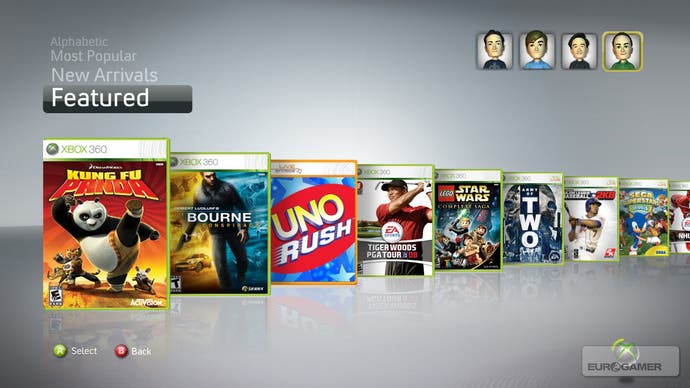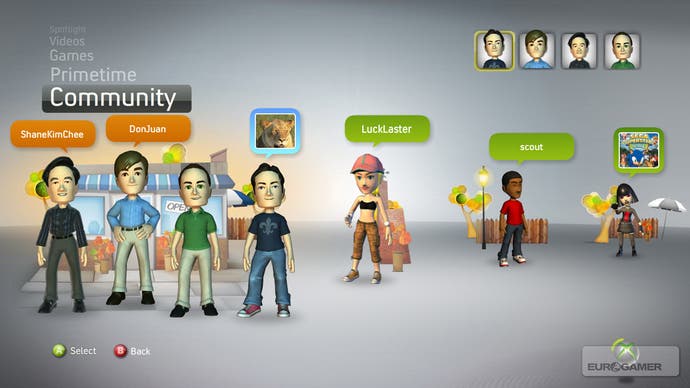The New Xbox Experience
360, redesigned.
The Rare-designed Avatars, it has to be said, are perhaps a little too palatable, a little too carefully focus-grouped. Blandly appealing, they capture neither the irrepressible silliness and charm of Miis nor the rather studied, realistic cool of Home avatars; they're very middle-of-the-road, very Microsoft. If they're to be embraced by families, casual gamers and Xbox's loyal hardcore alike, perhaps that's what's required - and in any event, the test of Avatars will be in their application, not their design.
"We don't pretend to have invented the concept of avatars," Schappert told us in conversation at E3, perhaps implying that Nintendo can't make the same claim either. In any event, Microsoft should be credited with looking a little further afield than Miis for inspiration. Downloadable accessories and clothing - whether purchased with Microsoft Points, doled out as Achievement rewards, or by developers as game promotions - are a very canny steal from the Asian free-gaming market pioneered by Nexon's MapleStory.
You can be sure that Microsoft will be more thorough in using Avatars, and encouraging third-parties to use them, than Nintendo has with its creations. The clearest example of this we currently know about is also, perhaps, the new interface's most exciting feature: the Primetime channel.
Schappert describes Primetime as the meeting point between gaming and TV; topical, social content, concentrating on quiz games at first, that changes on a daily schedule. Reality and quiz show giant Endemol - creator of the Big Brother phenomenon - is Microsoft's first partner in this venture, and will be bringing its 1 vs 100 format to the channel as a massively multiplayer online quiz game where the contestant, the host, the audience are all players, represented by their Avatars. Although there will be a jump-in mode, the main event will be daily quizzes held at a certain time of day; programmed, live entertainment, communally shared on a massive scale, just like TV.
Although it might have its genesis in the likes of Nintendo's Everybody Votes channel - and although similar concepts are already happening on TV, and starting to on the internet - Primetime is on another level entirely. It genuinely is the new kind of console gaming that Microsoft is billing it as, and it has enormous potential. We predict that this - not Scene It or Lips or You're In The Movies - is where Microsoft will finally make an impact on casual gaming. Localising it will be hard work, but Schappert promises that it will come to all the key European territories.

The other channels are more predictable. There's no single Marketplace hub any more, the relevant sections being accessed through the Games and Videos channels. Games will give you access to your stored Arcade games and demos, and run features such as "The Major's Picks". Videos will play host to the streaming film service for Netflix subscribers, one of the most enticing aspects of the new front end but, sadly, one that has little chance of reaching 360 owners outside the US.
The update will grant the 360 with a couple of other notable new abilities: you'll be able to install all DVD games to the hard drive and play them from there, increasing loading speeds by some 30 per cent (and, presumably, cutting noise too), although you'll still need to insert the disc to play. The Marketplace will also have a presence on the web; you'll be able to browse and buy downloads there, which will be automatically queued up for download to your 360 when you turn it on (or fetched immediately, if you choose to leave it on).
The most confident touch of the whole thing, perhaps, is the revamped Guide. Pressing the Guide button at any point, during gameplay or otherwise, brings up a neat, condensed version of the original blade interface with the entire front-end functionality available. This is the old-fashioned menu-drilling quick fix for when you know exactly what you want, and should make navigating the machine tremendously fast. Microsoft has cut out steps in the interface wherever possible; for example, to change between Arcade games, you will no longer need to back all the way out of one then drill all the way back down to the next. You'll simply bring up the Guide and hot-swap, directly.

If any of the 360's established fanbase has its misgivings about the new face of the machine, the Guide should silence them. This update really will be all things to all men, and in terms of style and substance, form and functionality, Schappert is right - it will move the Xbox 360 further forward than any console has been moved in its lifespan before.
If there's a question mark, it's over Microsoft's vision of its machine as a casual and social gaming hub. Nintendo's success with the Wii stems from owning the living room, encouraging players to interact with each other in the same space. Microsoft's social engineering, by contrast, is purely virtual and wholly internet-focused. The vision of solitary users watching movies together in separate rooms, together alone, doesn't immediately suggest the expanded demographic that Microsoft is after.
Preaching to the unconverted that a software update really has made Xbox 360 a different beast will be a mighty PR challenge, too. But whether it brings in a whole new audience or not, the New Xbox Experience will subtly shift the battleground in console gaming away from the hardware arms race, and towards Schappert's precious software and services. And that is ground that Microsoft is a whole lot more comfortable on.








